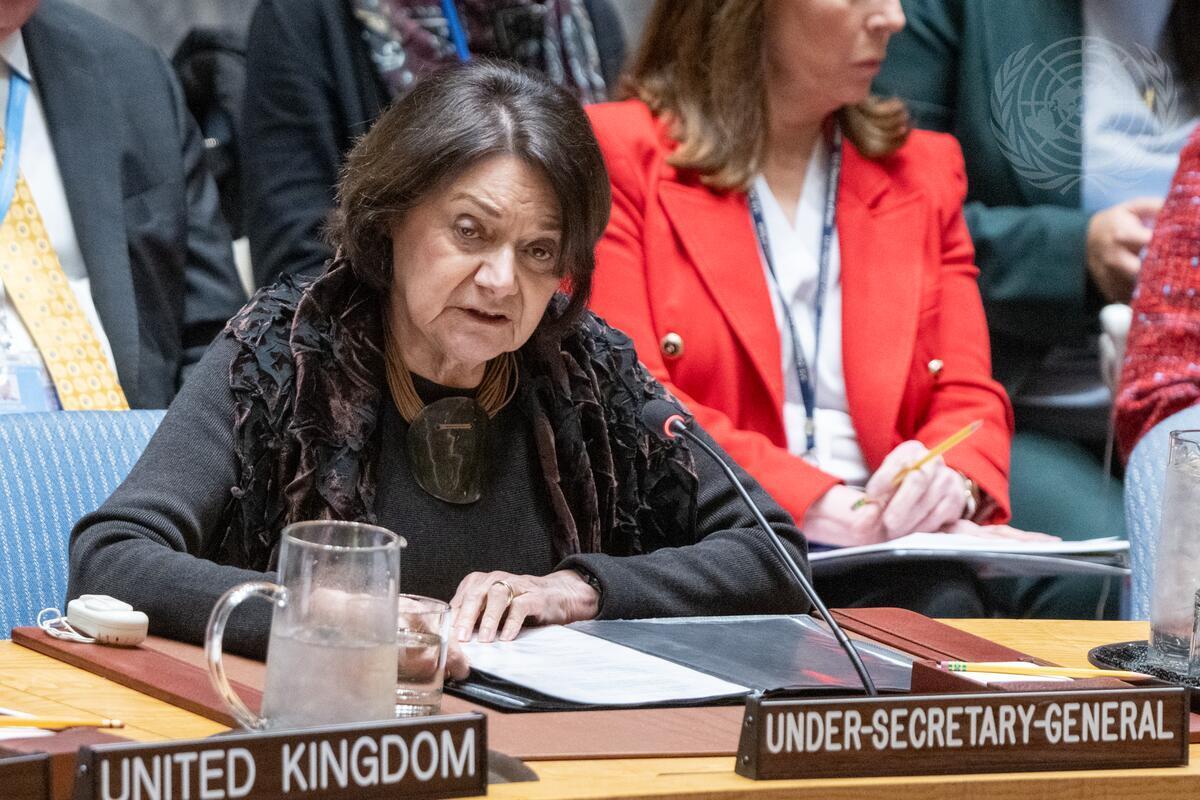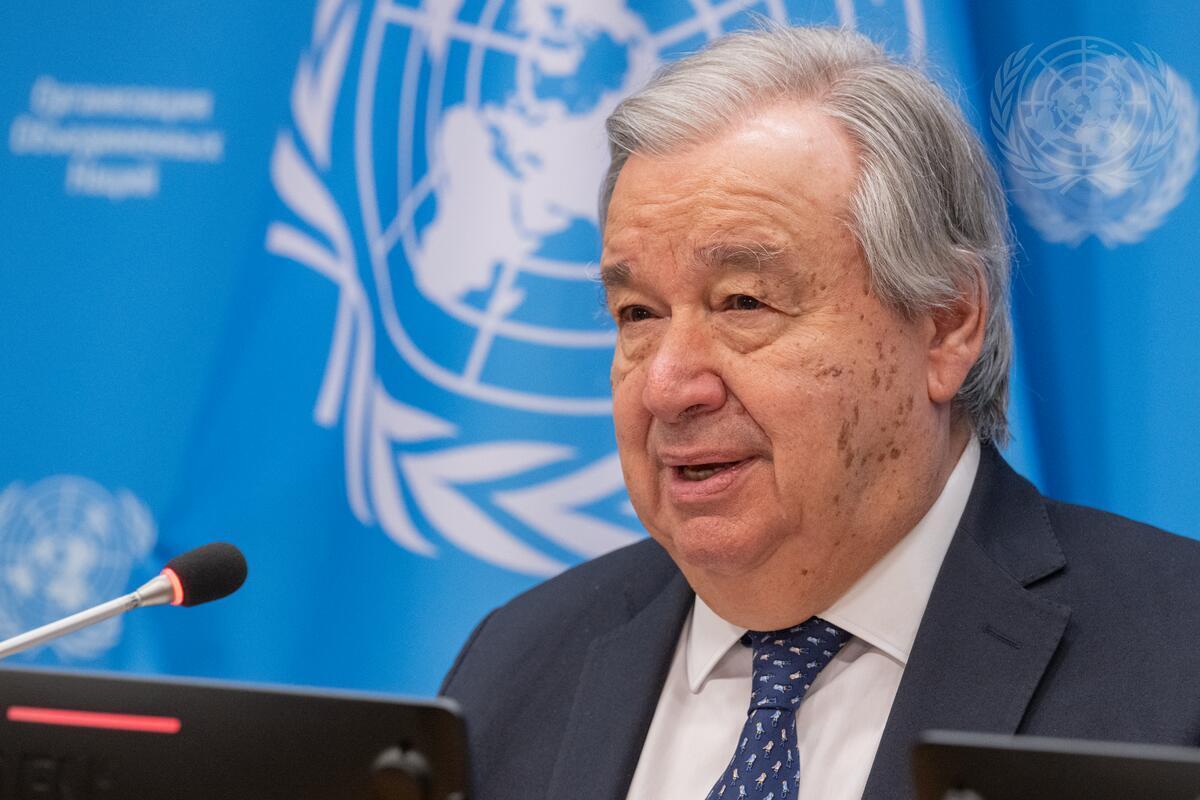Madame President,
Members of the Security Council,
On behalf of the Secretary-General, I will devote my regular briefing on the situation in the Middle East to presenting the twelfth report on the implementation of Security Council resolution 2334 (2016). The report covers the period between 12 September and 6 December 2019. As you have received the written report already, in today’s briefing I will provide an update on developments related to the provisions of the resolution that have taken place following the submission of the report to the Council.
As detailed in the report, no steps were taken during the reporting period to “cease all settlement activities in the occupied Palestinian territory, including East Jerusalem” as demanded by the resolution.
Demolitions and seizures structures also continued across the occupied West Bank, including East Jerusalem. Since 6 December an additional eight Palestinian-owned structures were demolished or seized by the Israeli authorities, resulting in the displacement of 20 people.
Madame President,
Security Council resolution 2334 also “calls for immediate steps to prevent all acts of violence against civilians.” Unfortunately, violence continued even during the few days since the submission of the report.
In the West Bank, including East Jerusalem, 16 Palestinians were injured in various incidents, including in clashes with ISF during demonstrations, security operations, settler-related attacks, and other incidents since the end of the reporting period.
Protests at the Gaza perimeter fence have also continued. While most demonstrations remained relatively peaceful, some protesters engaged in violent activities. The IDF responded with riot dispersal means and live fire, injuring some 38 people. On 17 December a Palestinian was killed by an Israeli drone as he approached the perimeter fence. According to the IDF, the man was armed. Three rockets were also launched by Gaza militants towards Israel, causing no injuries.
On 9 December, assailants slashed the tires of over 160 Palestinian cars in the Shu'fat neighborhood of East Jerusalem and sprayed anti-Arab graffiti. Additional vehicles were vandalized or set on fire in two villages in Bethlehem and in another two villages in Ramallah. The Israeli police are investigating the Shu’fat incident.
Several dozen Israeli activists from the “Tag Me’ir” Forum conducted a visit to the Shu’fat neighborhood following the attack in order to express their rejection of the violence and their solidarity with Shu’fat’s residents. They were hosted by Hussein and Suha Abu Khdeir, whose son Mohammad was murdered in a terror attack in 2014.
Madame President,
Security Council resolution 2334 (2016) calls upon the parties “to refrain from provocative actions, incitement, and inflammatory rhetoric.” Unfortunately, such actions and rhetoric have continued.
The resolution also reiterated calls by the Middle East Quartet for “affirmative steps to be taken immediately to reverse negative trends on the ground that are imperiling the two-State solution.”
In recent weeks, the United Nations has continued its engagement with senior Palestinian officials and different factions towards holding inclusive elections throughout the Occupied Palestinian Territory (OPT).
In preparation for possible 2020 parliamentary and presidential elections, and after the request for technical assistance from Palestine’s Central Election Commission (CEC), a United Nations electoral Needs Assessment Mission (NAM) was deployed to the OPT earlier this week.
On 10 December, the Palestinian Authority announced that it had officially sent a request to Israel to allow Palestinian residents of East Jerusalem to participate in potential presidential and legislative elections.
Madame President,
I would like to focus on some of the observations concerning the implementation of the provisions of the resolution.
In the three years since the Security Council resolution 2334 adopted, plans for over 22,000 units have been advanced or approved in West Bank settlements, including in East Jerusalem. Tenders for some 8,000 units have been issued. These numbers should be of serious concern to all those who continue to support the establishment of an independent and viable Palestinian state alongside Israel.
Resolution 2334 (2016) clearly states that the establishment of settlements in the Palestinian territory occupied since 1967, including East Jerusalem, has no legal validity and constitutes a flagrant violation under international law and a major obstacle to the achievement of the two-State solution and a just, lasting and comprehensive peace. Settlements must therefore cease immediately and completely.
The continued demolitions and seizures of Palestinian structures, including internationally funded humanitarian projects, is also of significant concern. This practice is not in line with international humanitarian law and must stop. Affected populations must be duly compensated for damages incurred. Similarly, the high number of Palestinian households in East Jerusalem with eviction cases filed against them is alarming. Israel, as an occupying power, must abide by its obligations under international humanitarian law.
I remain gravely concerned about the continuing violence, terrorist attacks against civilians, and incitement to violence that greatly exacerbate mistrust between Israelis and Palestinians and are fundamentally incompatible with a peaceful resolution of the conflict.
The indiscriminate launching of rockets and mortars towards Israeli civilian population centers is prohibited by international humanitarian law, and Palestinian militants must cease this practice immediately.
The security situation in Gaza remains very fragile. The use of force by Israel at the Gaza perimeter fence and the number of Palestinians killed and injured also remains a significant concern. Security forces must exercise maximum restraint and only use lethal force when strictly necessary and in response to an imminent threat of death or serious injury. Hamas must stop the firing of rockets and ensure that protests remain peaceful. Children should never be the target of violence nor used or put in harm’s way.
Reports of increased number of settler related attacks and harassment are also deeply concerning. Particularly around the olive harvest season and in Hebron. Further measures must be taken to ensure that Israel fulfills its obligation to protect Palestinian civilians from violence, including by Israeli settlers, and to investigate and hold accountable those responsible for such attacks.
Provocative and inflammatory rhetoric during the reporting period has continued to deepen the divide and has fueled further mistrust between Israelis and Palestinians. Leaders and officials must set a tone that encourages tolerance and facilitates increased dialogue.
I am particularly appalled by and call on all to join the UN in condemning all racist and inflammatory statements that aim to spread fear and hatred among people. Regrettably statements on the prospect of annexation of the Jordan Valley and other parts of the West Bank also continue. Such steps, if implemented, would constitute a serious violation of international law and would be destructive to the realization of the two-State solution and prospects for peace.
September marked one year since the start of the implementation of the UN package of urgent humanitarian and economic interventions for Gaza. The efforts to date have achieved important results, yet the situation remains very fragile. Security risks abound, movement and access restrictions remain severe and there has been no progress towards intra-Palestinian unity. Some of the investments made to date as a result of efforts by the United Nations will end on 31 December, and without additional funding and a durable Israeli and Palestinian commitment, the situation in Gaza could, once again, be pushed to the brink of collapse. The stakes are too high to allow this to happen, all stakeholders must act to prevent the ongoing crisis in Gaza from deepening further.
On its own, no amount of humanitarian or economic support will resolve either the situation in Gaza or the broader conflict. Gaza ultimately requires political solutions. Taking into consideration its legitimate security concerns, I urge Israel to ease the restrictions on the movement of goods and people to and from Gaza, with the goal of ultimately lifting them. Only by fully lifting the closures, in line with Security Council resolution 1860 (2009), can we hope to sustainably resolve the humanitarian crisis. It is also critical to end the militant build-up in Gaza, the constant threat of rocket fire and reunite Gaza and the West Bank under a single, legitimate Palestinian national authority, in accordance with the recommendations of the 2016 Middle East Quartet Report.
In this context, it is critical that the important Egyptian-led intra-Palestinian reconciliation efforts continue. The United Nations stands firm in its support of Egypt’s efforts in this regard, and I call on all Palestinian factions to make serious efforts to advance Palestinian unity.
I welcome ongoing discussions on the holding of Palestinian general elections. If elections materialize, they would be the first Palestinian elections since 2006, giving renewed legitimacy to national institutions. The international community should support this process.
As I emphasized in my previous briefing to the Council, three critical elements are required for elections to be credible: First, they must be organized across the OPT – in the West Bank, including East Jerusalem, and Gaza – in line with the Palestinian Basic Law, electoral legislation and international best practices; second, both legislative and presidential elections are necessary and should be held within a clearly identified and reasonable timeframe; and third, broad intra-Palestinian agreement must be reached on the modalities of holding elections.
Palestinians have been denied their democratic right to vote for too long. I am hopeful that the Palestinian President will very soon issue the decree scheduling legislative and presidential elections and that Israel will allow voting in East Jerusalem as well.
Despite the partial agreement reached between Israel and the Palestinian Authority on 3 October on clearance revenues, it remains critical that both sides engage in a constructive manner with the goal of restoring the revenue transfers in full in accordance with the Paris Protocol on Economic Relations.
Madame President,
UNRWA’s financial situation, unfortunately, has continued to worsen. Urgent disbursement of donor funds is essential to ensure operations can be sustained through the end of the year.
I also call on Member States to support the 2020 Humanitarian Response Plan (HRP) for the OPT, launched on 11 December. The 2020 HRP appeals for $348 million to provide basic food, protection, health care, shelter, water and sanitation to 1.5 million Palestinians in the Gaza Strip and the West Bank, including East Jerusalem.
Madame President,
This month marks three years since the adoption of Security Council resolution 2334 (2016). The situation on the ground since then has only deteriorated. Settlements have expanded significantly, demolitions have accelerated, violence and incitement have continued, achieving intra-Palestinian unity remains elusive, and credible negotiations have yet to be launched. I remain greatly concerned by the persistent lack of progress towards ending the occupation and realizing a negotiated two-State solution. As I have consistently stated, it is not enough to call for the renewal of our collective efforts to this end, we must take concrete action.
Absent the renewed commitment of the parties and the international community to pursue concrete measures that will lead to genuine political progress, the situation will continue to worsen. The Israeli-Palestinian conflict is in a fragile phase with the occupation deepening, political uncertainty prevailing, and volatile regional dynamics threatening to further de-stabilize the situation.
I once again urge leaders on all sides to summon the necessary political will to take concrete steps in support of ending the occupation and realizing a lasting peace, resulting in two democratic States, Israel and Palestine, living side by side in peace with secure and recognized borders, with Jerusalem as the capital of both states.
Thank you.






